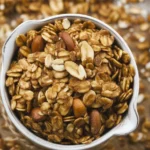
Starting your day with protein isn’t just a trend—it’s backed by science. Protein helps regulate blood sugar, keeps you full longer, and supports muscle repair and growth, which is especially crucial if you’re active. According to Harvard Health, eating 20–30 grams of protein at breakfast can improve satiety and reduce snacking later in the day. For busy folks, this means fewer trips to the vending machine and more focus on your to-do list. I remember my days of grabbing a bagel on the go—by mid-morning, I was ravenous and foggy-headed. Switching to protein-rich meals changed everything, giving me steady energy to tackle meetings and errands.
Protein also plays a role in metabolism. A study from the American Journal of Clinical Nutrition found that high-protein meals can increase thermogenesis—the process of burning calories to digest food—by up to 30% more than high-carb meals. This means your body works harder to process that Greek yogurt bowl than a bowl of cereal, giving you a slight metabolic edge. Beyond science, high-protein breakfasts are practical. They’re versatile, can be prepped in advance, and don’t require hours in the kitchen—perfect for those mornings when you’re sprinting out the door.
Read Also: Why Go Egg-Free for Breakfast?
The Benefits of Protein for Your Morning Routine
Let’s break down why protein deserves a starring role in your breakfast, especially when time is tight:
- Sustained Energy: Unlike carbs that spike and crash your blood sugar, protein provides a steady energy release. This is a lifesaver when you’re juggling Zoom calls or running to catch a bus.
- Hunger Control: Protein slows digestion, keeping you full until lunch. A study in Obesity showed that high-protein breakfasts reduced hunger hormones like ghrelin more effectively than high-carb ones.
- Mental Clarity: Ever hit a mid-morning brain fog? Protein supports neurotransmitter function, helping you stay sharp. I noticed this when I swapped toast for eggs—my focus during morning tasks skyrocketed.
- Muscle Support: If you work out, protein aids muscle recovery. Even if you don’t, it helps maintain muscle mass, which is key for overall health, per Mayo Clinic.
- Versatility: From smoothies to egg muffins, protein-rich foods fit any schedule or taste preference, making them ideal for busy mornings.
These benefits aren’t just theoretical. When I started prioritizing protein, I went from feeling sluggish to powering through my mornings with energy to spare. Let’s explore how to make this work for you.
Choosing the Best Protein Sources for Breakfast
Not all proteins are created equal. For busy mornings, you want options that are quick, nutrient-dense, and easy to prepare. Here’s a rundown of top choices, with protein content and prep tips:
- Eggs: A single egg packs about 6 grams of protein. Scramble them in under 5 minutes or hard-boil a batch for the week. They’re affordable and endlessly versatile.
- Greek Yogurt: With 20 grams of protein per cup, it’s a powerhouse. Pair with fruit and nuts for a no-cook option. Opt for unsweetened to avoid added sugars.
- Cottage Cheese: Often overlooked, it delivers 25 grams of protein per cup. Blend it into smoothies or top with berries for a quick meal.
- Protein Powder: A scoop (20–25 grams of protein) can transform a smoothie or oatmeal. Look for ones with minimal ingredients, like those recommended by Healthline.
- Tofu: A vegan favorite, with 10 grams of protein per half-cup. Scramble it like eggs with spices for a plant-based option.
- Nut Butters: Two tablespoons of peanut or almond butter offer 7–8 grams of protein. Spread on toast or blend into shakes.
- Lean Meats: Turkey bacon or chicken sausage can add 15–20 grams of protein. Pre-cook for grab-and-go convenience.
Mixing these sources keeps things interesting. For example, I love combining Greek yogurt with a scoop of protein powder and frozen berries for a 30-gram protein smoothie that takes 3 minutes to make.
Quick and Delicious High-Protein Breakfast Recipes
Now, let’s get to the good stuff: recipes that are fast, tasty, and protein-packed. These are designed for busy mornings, requiring minimal prep and cleanup. Each serves one but can be scaled up.
1. Five-Minute Egg and Avocado Toast
This is my go-to when I’m short on time but need something hearty. Eggs and avocado are a match made in heaven, delivering protein and healthy fats.
Ingredients:
- 2 eggs (12g protein)
- 1 slice whole-grain bread (5g protein)
- ¼ avocado
- Salt, pepper, and optional chili flakes
Instructions:
- Toast the bread.
- Scramble or fry eggs to your liking (takes 3–4 minutes).
- Mash avocado onto toast, top with eggs, and season.
Total Protein: ~17 grams
Time: 5 minutes
2. Overnight Protein Oats
Perfect for meal preppers, these oats are ready when you wake up. I make a batch on Sundays to grab all week.
Ingredients:
- ½ cup rolled oats (5g protein)
- ¾ cup Greek yogurt (15g protein)
- 1 tbsp chia seeds (3g protein)
- ½ cup almond milk
- 1 tbsp almond butter (4g protein)
- Fresh berries for topping
Instructions:
- Mix oats, yogurt, chia seeds, and almond milk in a jar.
- Refrigerate overnight.
- Top with almond butter and berries in the morning.
Total Protein: ~27 grams
Time: 2 minutes prep, overnight rest
3. Tofu Breakfast Scramble
A vegan option that’s just as satisfying as eggs. I discovered this during a plant-based phase, and it’s still a staple.
Ingredients:
- ½ cup firm tofu (10g protein)
- 1 cup spinach
- ¼ tsp turmeric
- 1 tbsp nutritional yeast (2g protein)
- 1 whole-grain tortilla (5g protein)
Instructions:
- Crumble tofu into a pan, add turmeric and nutritional yeast.
- Sauté with spinach for 5 minutes.
- Wrap in a tortilla for a portable breakfast.
Total Protein: ~17 grams
Time: 7 minutes
These recipes are just a starting point. You can swap ingredients based on what’s in your pantry or your dietary needs, making them perfect for any busy morning.
Comparison Table: High-Protein Breakfast Options for Busy Mornings
| Breakfast Option | Protein (g) | Prep Time | Portability | Cost per Serving | Best For |
|---|---|---|---|---|---|
| Egg and Avocado Toast | 17 | 5 min | Moderate | ~$1.50 | Quick, savory lovers |
| Overnight Protein Oats | 27 | 2 min (plus overnight) | High | ~$1.80 | Meal preppers |
| Tofu Breakfast Scramble | 17 | 7 min | High | ~$1.20 | Plant-based diets |
| Greek Yogurt Parfait | 25 | 3 min | High | ~$1.50 | No-cook enthusiasts |
| Protein Smoothie | 30 | 3 min | Very High | ~$2.00 | On-the-go mornings |
This table, inspired by EatingWell, highlights options for different needs. Smoothies win for speed and portability, while oats are budget-friendly and prep-ahead friendly.
Meal Prep Hacks for High-Protein Breakfasts
For busy mornings, preparation is everything. Here are some game-changing meal prep strategies to ensure you’re never without a protein-packed breakfast:
- Batch Cook Eggs: Hard-boil a dozen eggs on Sunday for grab-and-go snacks or quick salads. They last up to a week in the fridge, per USDA guidelines.
- Pre-Portion Smoothies: Blend ingredients and freeze in single-serve bags. Just dump into a blender with liquid in the morning.
- Make-Ahead Egg Muffins: Whisk eggs with veggies and cheese, pour into a muffin tin, and bake. Store in the fridge for up to 4 days.
- Overnight Oats Jars: Prep 5 jars with oats, yogurt, and toppings. They stay fresh for 5–7 days.
- Protein Bars: Homemade or store-bought (check for low sugar), these are perfect for days when you’re out the door in seconds.
I’ve found that spending 30 minutes on Sunday prepping saves me hours during the week. It’s like giving your future self a gift—no stress, just a ready-to-eat breakfast.
High-Protein Breakfasts for Special Diets
Not everyone’s dietary needs are the same, so let’s explore how to adapt high-protein breakfasts for common restrictions:
- Vegetarian: Focus on eggs, Greek yogurt, cottage cheese, or tofu. A veggie omelet with cheese can hit 20 grams of protein easily.
- Vegan: Tofu, tempeh, and protein powders (like pea or hemp) are key. Try a smoothie with spinach, banana, and vegan protein powder for 25 grams of protein.
- Keto: Stick to eggs, avocado, and low-carb meats like bacon. A keto egg muffin with sausage and cheese is both filling and portable.
- Gluten-Free: Use gluten-free oats or bread. A Greek yogurt parfait with gluten-free granola works well, as suggested by Celiac.org.
- Dairy-Free: Swap Greek yogurt for coconut or almond-based yogurt. Add nuts or seeds for extra protein.
These adaptations ensure everyone can enjoy a high-protein start, no matter their restrictions. I’ve had friends with dietary needs rave about how easy it is to tweak these recipes without sacrificing flavor.
Overcoming Common Breakfast Barriers
Busy mornings come with obstacles—lack of time, appetite, or inspiration. Here’s how to tackle them:
- No Time? Prep the night before or choose no-cook options like smoothies. Keep pre-portioned ingredients ready.
- Not Hungry? Start small with a protein shake or a handful of nuts. Appetite often kicks in as your body adjusts.
- Boredom? Experiment with flavors—think Mexican-inspired egg wraps or tropical smoothie bowls. Variety keeps it fun.
- Budget Concerns? Eggs, oats, and peanut butter are dirt-cheap. Buy in bulk to save more, as noted by Budget Bytes.
When I started prioritizing breakfast, I faced these hurdles too. A little planning and creativity made all the difference, turning chaotic mornings into a breeze.
FAQ: Your High-Protein Breakfast Questions Answered
Q: How much protein do I need at breakfast?
A: Aim for 20–30 grams, as recommended by WebMD. This supports satiety and energy without overloading your system.
Q: Can I get enough protein without meat?
A: Absolutely! Greek yogurt, eggs, tofu, and plant-based protein powders can easily hit 20+ grams. Combine sources like nuts and seeds for variety.
Q: Are protein bars a good breakfast option?
A: They’re convenient but check for added sugars. Homemade bars or brands like RXBAR are solid choices for 12–20 grams of protein.
Q: How do I make breakfast kid-friendly?
A: Blend protein into smoothies with fruit or make mini egg muffins with fun shapes. Kids love customizable yogurt parfaits with colorful toppings.
Q: Can I prep high-protein breakfasts for the whole week?
A: Yes! Overnight oats, egg muffins, and hard-boiled eggs last 4–7 days in the fridge. Smoothies can be pre-portioned and frozen.
Q: What if I’m not a morning person?
A: Focus on no-cook or grab-and-go options like protein shakes or pre-made oats. Keep a stash in your bag for emergencies.
Conclusion: Start Your Day Strong, No Matter How Busy
High-protein breakfasts are more than just a meal—they’re a strategy for thriving in a fast-paced world. Whether you’re scrambling eggs in five minutes, grabbing overnight oats from the fridge, or blending a smoothie on your way out, these meals deliver the energy, focus, and satisfaction you need to conquer your day. My own journey from skipping breakfast to embracing protein-packed mornings taught me that small changes can have a big impact. You don’t need to be a chef or have hours to spare—just a bit of planning and a willingness to experiment.
Try one of the recipes above, start small with a protein shake, or dedicate 30 minutes this weekend to meal prep. Your body and mind will thank you. For more inspiration, check out resources like Verywell Fit for additional high-protein ideas or dive into meal prep tips on The Kitchn. Here’s to mornings that fuel you, no matter how hectic they get!









